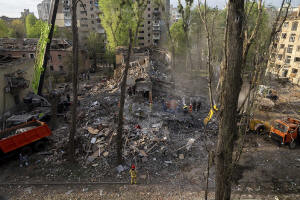In rare rebuke of Putin, Trump urges Russia to 'STOP!' after deadly
attack on Kyiv
[April 25, 2025]
By AAMER MADHANI and SAMUEL PETREQUIN
WASHINGTON (AP) — President Donald Trump on Thursday offered rare
criticism of Vladimir Putin, urging the Russian leader to “STOP!” after
a deadly barrage of attacks on Kyiv, Ukraine's capital.
“I am not happy with the Russian strikes on KYIV. Not necessary, and
very bad timing. Vladimir, STOP! 5000 soldiers a week are dying.” Trump
said in a post on his Truth Social platform. “Lets get the Peace Deal
DONE!”
Russia struck Kyiv with an hourslong barrage of missiles and drones. At
least 12 people were killed and 90 were injured in the deadliest assault
on the city since last July.
Trump’s frustration is growing as a U.S.-led effort to get a peace
agreement between Ukraine and Russia has not made progress.
The comments about Putin came after Trump lashed out at Ukrainian
President Volodymyr Zelenskyy on Wednesday and accused him of prolonging
the “killing field” by refusing to surrender the Russia-occupied Crimean
Peninsula as part of a possible deal. Russia illegally annexed that area
in 2014.
With his assertion that Putin demonstrated “very bad timing" with the
massive attack, Trump appeared to suggest that the Russian leader was
doing himself no favors toward achieving the Kremlin's demand that any
peace agreement include Russia keeping control of Crimea as well as
Ukrainian territory in the Luhansk, Donetsk, Zaporizhzhia and Kherson
regions it has seized since invading in February 2022.
Later Thursday during an Oval Office meeting with Norwegian Prime
Minister Jonas Gahr Støre, Trump said that Crimea was taken from Ukraine
without a fight. He also noted that annexation of the Black Sea
peninsula happened under President Barack Obama's watch.

Asked what Putin is doing now to help forge a peace deal, Trump
responded, “stopping taking the whole country, pretty big concession.”
But the notion is one that Ukraine and much of Europe have fiercely
pushed back against, arguing that Russia pausing a land grab is hardly a
concession.
Zelenskyy has repeated many times that recognizing occupied territory as
Russia's is a red line for Ukraine. He noted Thursday that Ukraine had
agreed to a U.S. ceasefire proposal 44 days ago as a first step to a
negotiated peace, but that Moscow's attacks had continued.

Trump’s criticism of Putin is notable because Trump has repeatedly said
Russia is more willing than Ukraine to get a deal done.
“I didn’t like last night,” Trump said of Russia’s massive attack on
Kyiv. “I wasn’t happy with it.”
In his dealings with Zelenskyy and Putin, Trump has focused on which
leader has leverage. Putin has “the cards” and Zelenskyy does not, Trump
has said repeatedly. At the same time, the new Republican administration
has taken steps toward a more cooperative line with Putin, for whom
Trump has long shown admiration.
Trump in his meeting with Norway's Gahr Støre discussed the war in
Ukraine, U.S. tariffs and other issues.
Norway, a member of NATO and strong supporter of Ukraine, shares a
roughly 123-mile (198-kilometer) border with Russia.
Gahr Støre said “both parties have to know that they have to deliver."
He also suggested that Trump is pushing the two sides to come to an
agreement.
[to top of second column]
|

Rescue workers clear the rubble after a Russian strike in a
residential neighborhood in Kyiv, Ukraine, Thursday, April 24, 2025.
(AP Photo/Alex Babenko)

“To move towards an end of this war, U.S engagement is critical, and
President Trump made that possible," he said. "That is clear”
Meanwhile, French President Emmanuel Macron said Putin should “stop
lying” when he claims to want “peace” while continuing to bomb
Ukraine.
“There is only one answer we are waiting for: Does President Putin
agree to an unconditional ceasefire?” said Macron during a visit to
Madagascar. Macron added that “the Americans’ anger should focus on
just one person: President Putin.”
The French Foreign Ministry also offered measured pushback on
Trump's criticism of Zelenskyy over the Ukrainian's stance on
Crimea.
During talks last week in Paris, U.S. officials presented a proposal
that included allowing Russia to keep control of occupied Ukrainian
territory as part of a deal, according to a European official
familiar with the matter. The proposal was discussed again Wednesday
during talks with U.S., European, and Ukrainian officials.
“The principle of Ukraine’s territorial integrity is not something
that can be negotiated,” Foreign Ministry spokesman Christophe
Lemoine said. “This was the position taken last week and reiterated
yesterday in London in a meeting of a similar format.”
Asked whether France agreed with Trump’s comments that Ukraine’s
position was to blame for prolonging the war, Lemoine said
Ukrainians showed they are open to negotiations while Russia
continues its strikes.
“We rather have the impression that it is the Russians who are
slowing down the discussions,” he said.
The White House announced Tuesday that Trump's special envoy, Steve
Witkoff, would visit Moscow this week for a new round of talks with
Putin about the war. It would be their fourth meeting since Trump
took office in January.
Defense Secretary Pete Hegseth met on Thursday with NATO
Secretary-General Mark Rutte, who also held talks with Secretary of
State Marco Rubio and Trump's national security adviser, Michael
Waltz.
Leaders from the 32-member alliance are set to meet in the
Netherlands in two months. Trump has pushed them to significantly
step up defense spending.
In 2023, as Russia’s invasion of Ukraine entered its second year,
they agreed that all allies should spend at least 2% of gross
domestic product on their military budgets. Estimates in NATO's
annual report released Thursday showed that 22 allies had reached
that goal last year, compared with a previous forecast of 23.
“But clearly with 2%, we cannot defend NATO territory,” Rutte told
reporters at the White House following the meeting. “It has to be
considerably higher.”
___
Petrequin reported from Paris. Associated Press writer Lorne Cook in
Brussels contributed to this report.
All contents © copyright 2025 Associated Press. All rights reserved
 |